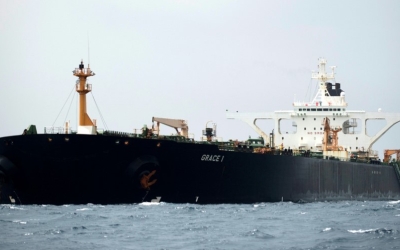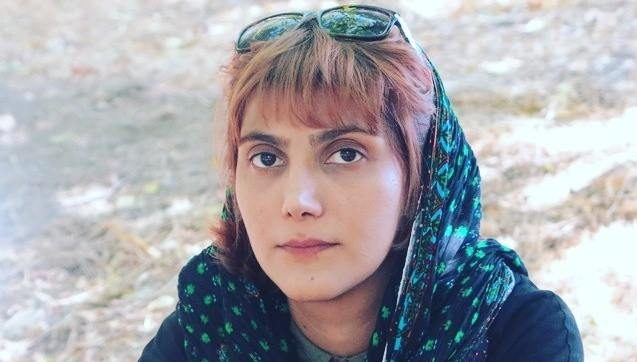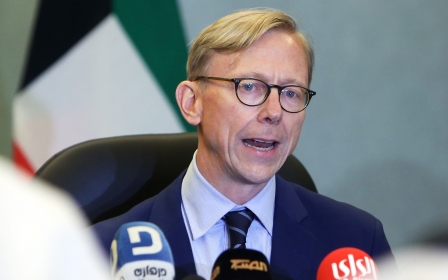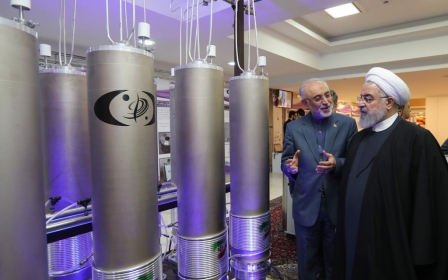Iranian press review: Iran to develop new centrifuges in response to US sanctions
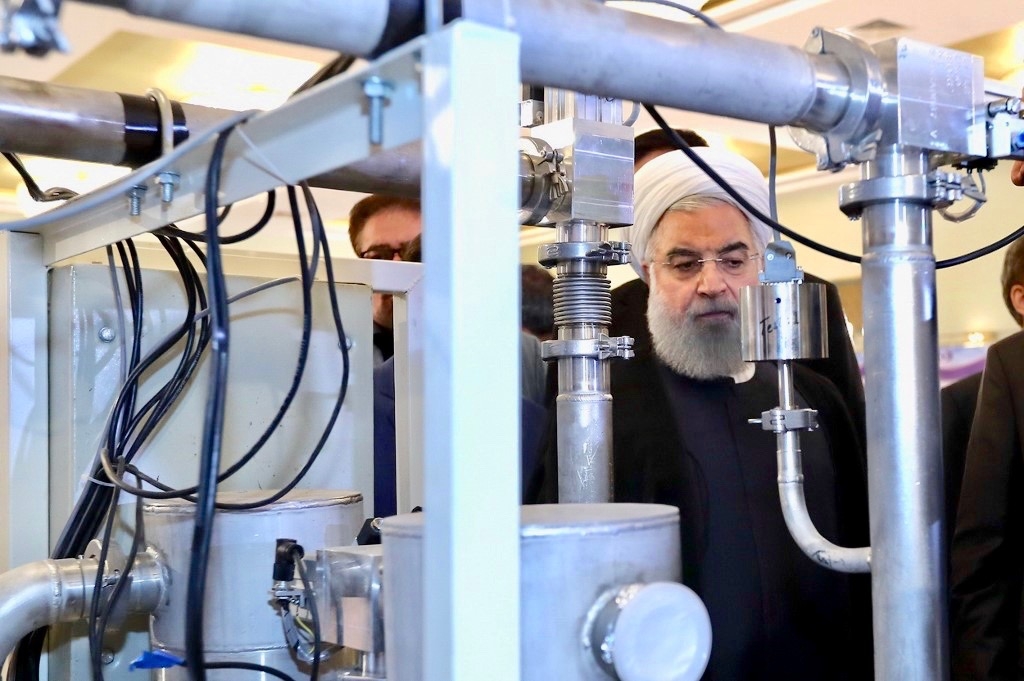
Iranian President Hassan Rouhani has asked the country's Atomic Energy Organisation to resume development of a new generation of centrifuges to speed up uranium enrichment, in Tehran's latest response to the US withdrawal from a 2015 nuclear agreement.
Under the deal with world powers, Iran was allowed to keep restricted quantities of first-generation centrifuges at two nuclear plants.
Rouhani announced the order at around midnight on Wednesday following a meeting with the head of Iran's judiciary and the speaker of parliament, ISNA news agency reports.
The news, published by Iranian outlets, followed a week of speculation about the outcome of the latest talks between Iran and France to try to save the nuclear deal.
In May, Iran began a gradual move to reduce its commitments to the nuclear deal in response to the the decision last year by the US to unilaterally withdraw from the pact and impose devastating sanctions on Iran's oil exports, banking system, and financial organisations.
New MEE newsletter: Jerusalem Dispatch
Sign up to get the latest insights and analysis on Israel-Palestine, alongside Turkey Unpacked and other MEE newsletters
At the time, Iran said it would reduce its commitments to the deal if the other European signatories failed to find a way to provide the economic relief agreed upon in the nuclear accord.
On Wednesday, after Tehran extended a deadline for Europeans to act, Iran Foreign Minister Mohammad Javad Zarif said that Tehran was still ready for talks, however it would continue taking steps towards breaching the deal's limits, the Tasnim news agency reported.
"If the negotiations reach a result, our steps will be stopped and even reversed," Tasnim quoted Zarif as saying.
"However, if the European countries cannot fulfil their commitments in providing Iran the possibility of selling its oil, then Iran will continue its steps."
During the past week, Rouhani's administration has been under pressure by hardliners to reject any offer from France, specifically a plan to receive $15bn in credit lines if Tehran comes fully back into compliance.
“First of all, this $15bn is just a credit line and not cash money [that Iran can have access to], Hossein Shariatmadari, representative of Iran's supreme leader, wrote in the Kayhan newspaper on Thursday.
On Thursday, the conservative Javan newspaper suggested that Iran's proportionate response to US sanctions, and the European countries inability to meet their promises, would be to quit the nuclear deal.
The daily also criticised Rouhani for reducing Iran's commitments in gradual steps and raised the question "how many other steps we can take?"
"Regime change is the only plan that Europe and the US have in mind," wrote Javan’s chief editor Gholam Reza Sadeghian.
"The only difference between them is that the US wants a total destruction of Iran, and Europe wants a regime change that would not have any negative impact on them."
Iran reacts to US attempts to bribe tanker captain
Zarif has strongly condemned Washington's move to offer millions of dollars to an Iranian tanker captain in return for piloting his ship to a country which would seize the vessel.
"Having failed at piracy, the US resorts to outright blackmail - deliver us Iran's oil and receive several million dollars or be sanctioned yourself," Zarif wrote on Twitter on Wednesday.
"Sounds very similar to the Oval Office invitation I received a few weeks back. It is becoming a pattern," he added, referring to an invitation that was reportedly withdrawn after he rejected a US offer and was then personally sanctioned by Washington.
On Thursday, the Financial Times revealed that Brian Hook, the US special representative for Iran, sent an email to Akhilesh Kumar, the captain of the Iranian tanker Adrian Darya 1, offering him "several million dollars" to direct the vessel to a place where it could be confiscated based on US sanctions against Iran.
The Iranian ambassador to London also condemned the US move, saying that Iran had voiced its concerns to the International Maritime Organisation and alerted it about the US authorities' threats against the Iranian tanker's captain and crew.
MP denounces harsh jail sentences for journalists, artists
In a short speech to parliament earlier this week, Iranian legislator Parvaneh Salahshouri severely condemned recent moves by the judicial system to punish journalists, artists and activists with long prison sentences.
In her speech, Salahshouri said that "these days, young girls are crying for justice from inside the prisons".
The outspoken lawmaker urged the head of the judiciary to revise the more than 10-year prison terms which were handed to Marzieh Amiri, a Shargh newspaper journalist, and Atefeh Rangriz, a labour activist, in July.
Rangriz and Amiri were arrested on May Day during a protest in front of parliament. In a lower court, Amiri was sentenced to 10 and a half years, while Rangriz was handed 11-and-a-half years.
Salahshouri also asked for a clear explanation for the arrest of the cinema and theatre photographer Nooshin Jafari, who was detained on 4 August.
More than 200 artists have signed a petition published on social media, raising their concerns about Jafari's detention, including reports that she has been pressured to make a false confession.
"We are deeply concerned about the conditions in which she (Jafari) is being kept and also about her well-being," the letter read.
"We urge [the judiciary] to provide her with access to prisoners' rights and a just trial."
Iran says Israel training eulogists as spies and infiltrators
A commander of Iran's paramilitary Basij group has claimed that Israel has trained religious eulogists whose goal is to defame Shia Islam and Ashura ceremonies, Khabar Online reports.
Yousef Arjouni, head of the Iranian Eulogists Basij Organisation, said that "a number of Israeli-trained eulogists have been arrested in Iran".
Arjouni did not elaborate further about the number of arrests and any charges, however unofficial sources suggested that two eulogists were arrested in July.
Meanwhile, the pro-reformist Etemad newspaper blamed religious eulogists for siding with hardliners and propagating criticism against Rouhani’s administration during Ashura religious ceremonies.
The daily also warned that during the current ten-day Ashura ceremony, which began on 1 September, more attacks will take place against Rouhani's attempts to keep the 2015 nuclear deal alive.
"In the coming days, we will see the confrontation of the two camps of supporters and opponents of the negotiations [with Western countries] for the improvement of the country's conditions," Etemad wrote.
*The Iranian press review is a digest of reports that are not independently verified as accurate by Middle East Eye.
Middle East Eye delivers independent and unrivalled coverage and analysis of the Middle East, North Africa and beyond. To learn more about republishing this content and the associated fees, please fill out this form. More about MEE can be found here.


